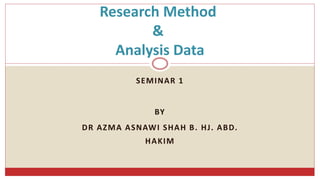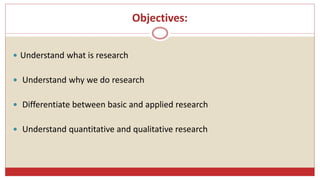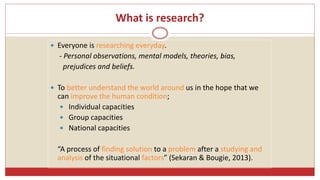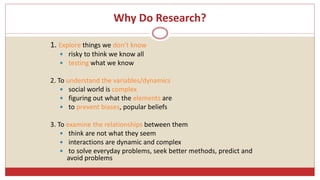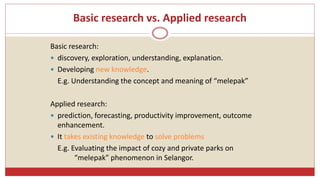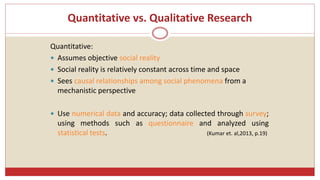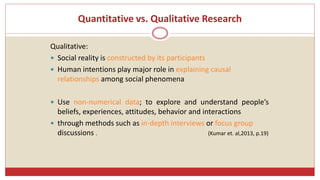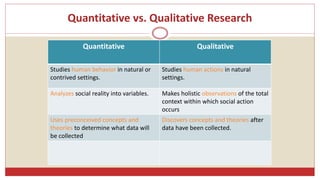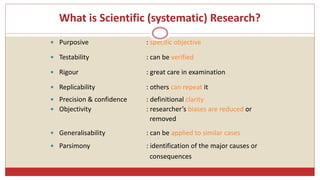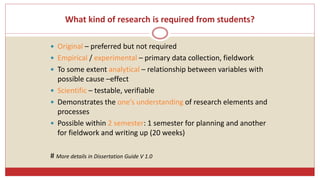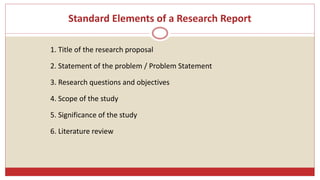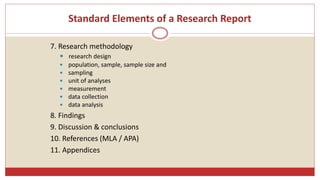Sem 1_ADS511.pptx
- 1. SEMINAR 1 BY DR AZMA ASNAWI SHAH B. HJ. ABD. HAKIM Research Method & Analysis Data
- 2. Objectives: яВЧ Understand what is research яВЧ Understand why we do research яВЧ Differentiate between basic and applied research яВЧ Understand quantitative and qualitative research
- 3. What is research? яВЧ Everyone is researching everyday. - Personal observations, mental models, theories, bias, prejudices and beliefs. яВЧ To better understand the world around us in the hope that we can improve the human condition; яВЧ Individual capacities яВЧ Group capacities яВЧ National capacities тАЬA process of finding solution to a problem after a studying and analysis of the situational factorsтАЭ (Sekaran & Bougie, 2013).
- 4. Why Do Research? 1. Explore things we donтАЩt know яВЧ risky to think we know all яВЧ testing what we know 2. To understand the variables/dynamics яВЧ social world is complex яВЧ figuring out what the elements are яВЧ to prevent biases, popular beliefs 3. To examine the relationships between them яВЧ think are not what they seem яВЧ interactions are dynamic and complex яВЧ to solve everyday problems, seek better methods, predict and avoid problems
- 5. Basic research vs. Applied research Basic research: яВЧ discovery, exploration, understanding, explanation. яВЧ Developing new knowledge. E.g. Understanding the concept and meaning of тАЬmelepakтАЭ Applied research: яВЧ prediction, forecasting, productivity improvement, outcome enhancement. яВЧ It takes existing knowledge to solve problems E.g. Evaluating the impact of cozy and private parks on тАЬmelepakтАЭ phenomenon in Selangor.
- 6. Quantitative vs. Qualitative Research Quantitative: яВЧ Assumes objective social reality яВЧ Social reality is relatively constant across time and space яВЧ Sees causal relationships among social phenomena from a mechanistic perspective яВЧ Use numerical data and accuracy; data collected through survey; using methods such as questionnaire and analyzed using statistical tests. (Kumar et. al,2013, p.19)
- 7. Quantitative vs. Qualitative Research Qualitative: яВЧ Social reality is constructed by its participants яВЧ Human intentions play major role in explaining causal relationships among social phenomena яВЧ Use non-numerical data; to explore and understand peopleтАЩs beliefs, experiences, attitudes, behavior and interactions яВЧ through methods such as in-depth interviews or focus group discussions . (Kumar et. al,2013, p.19)
- 8. Quantitative vs. Qualitative Research Quantitative Qualitative Studies human behavior in natural or contrived settings. Studies human actions in natural settings. Analyzes social reality into variables. Makes holistic observations of the total context within which social action occurs Uses preconceived concepts and theories to determine what data will be collected Discovers concepts and theories after data have been collected.
- 9. What is Scientific (systematic) Research? яВЧ Purposive : specific objective яВЧ Testability : can be verified яВЧ Rigour : great care in examination яВЧ Replicability : others can repeat it яВЧ Precision & confidence : definitional clarity яВЧ Objectivity : researcherтАЩs biases are reduced or removed яВЧ Generalisability : can be applied to similar cases яВЧ Parsimony : identification of the major causes or consequences
- 10. What kind of research is required from students? яВЧ Original тАУ preferred but not required яВЧ Empirical / experimental тАУ primary data collection, fieldwork яВЧ To some extent analytical тАУ relationship between variables with possible cause тАУeffect яВЧ Scientific тАУ testable, verifiable яВЧ Demonstrates the oneтАЩs understanding of research elements and processes яВЧ Possible within 2 semester: 1 semester for planning and another for fieldwork and writing up (20 weeks) # More details in Dissertation Guide V 1.0
- 11. Standard Elements of a Research Report 1. Title of the research proposal 2. Statement of the problem / Problem Statement 3. Research questions and objectives 4. Scope of the study 5. Significance of the study 6. Literature review
- 12. Standard Elements of a Research Report 7. Research methodology яВЧ research design яВЧ population, sample, sample size and яВЧ sampling яВЧ unit of analyses яВЧ measurement яВЧ data collection яВЧ data analysis 8. Findings 9. Discussion & conclusions 10. References (MLA / APA) 11. Appendices
